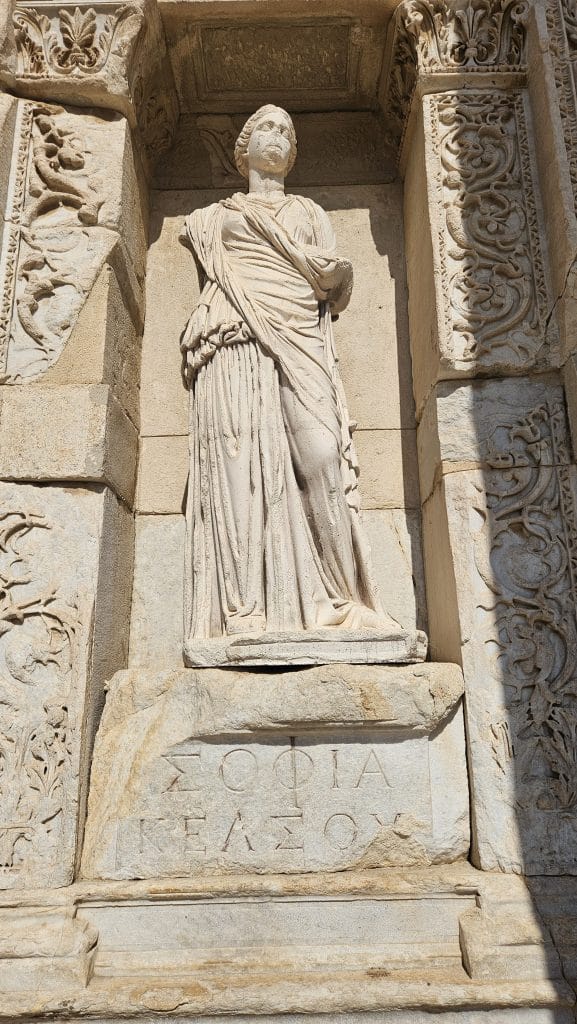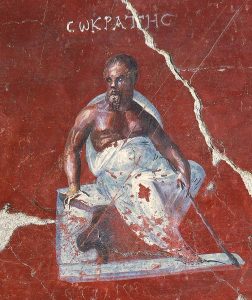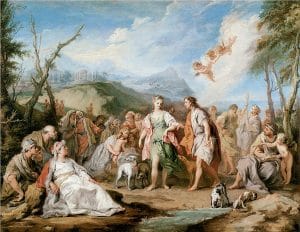Xenophon of Ephesus was an Ephesian writer who lived between the 2nd and 3rd centuries AD. His work that has survived to the present day is the Ephesian Tale of Antheia and Habrocomes, or Ephesiaka, one of the oldest novels and one of the sources of Shakespeare’s Romeo and Juliet. The most important feature of this novel is that it is the first romantic and sexually explicit novel written in the world.
The Ephesian Tale of Antheia and Habrocomes was a satirical piece on the philosophy of Stoicism, particularly the Stoic view of slavery. The two protagonists are believed to have been written as Stoics and to be unmoved when faced with adversity. The character Habrocomes punishes himself by realizing that he is in love with Antheia and calls himself the slave of love. Habrocomes is then enslaved and tortured. This contrast was written by Xenophon to illustrate the Stoic belief that slavery to passion is worse than legal slavery.
The Pirate who kidnapped Habrocomes intended to have a sexual encounter with the main character. Habrocomes is then left alone with his stoic philosophical ideals of accepting fate and being indifferent to external influences.
People who keep their promises and remain loyal to each other under all circumstances are virtuous, and their love is the greatest. This story is one of the most beautiful stories, and it tells how people who love each other very much can remain loyal to each other under all circumstances if they want to.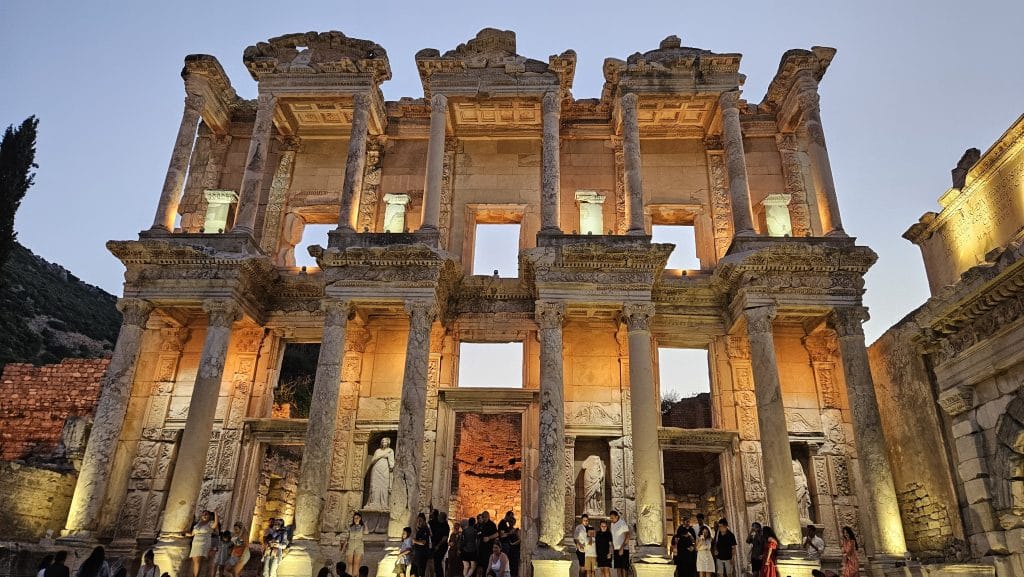
Blog Titles
ToggleThe Ephesus story of Antheia and Habrokomes
Lycomedes, one of the respected people of Ephesus, and his wife Temiste had a very handsome son named Habrokomes. 16-year-old Habrokomes was far ahead of his peers in sports and fine arts. But he neither knew Eros nor did he give a damn about girls. In short, he had nothing to do with love. The god Eros, who was very upset about this, decided to take revenge on Habrokomes. At the Artemis festival held that year, Habrokomes was walking at the head of the Ephesian young men. Everyone’s eyes were on the handsome Habrokomes. It was as if he were a young god descended from Olympus.
The leader of the young girls was Antheia. She was the daughter of Megademes and Evippe and was only 14 years old, but Antheia was beautiful, like a goddess. At one point during the festival, the two young people saw each other. Such festivals were places and times where young people saw each other, liked each other, and even met if they had the opportunity. Eros shot his arrows at both Habrokomes and Antheia, and these young people fell in love with each other.
As time passed, both of them fell into bed because of their blind love. Their families made offerings and sacrifices, but it was no use. The families were in a pitiful state. Finally, the fathers of both young people applied to the seer and priests of the Temple of Apollo at Claros, near the ancient city of Ephesus.
In the Temple of Apollo, the fathers of these young lovers were given the following answer by God Apollo: “Do you want to know the cause and effect of the illness of these two young people? Know well that the same bad events await both of them; the way out is the same. Both of them will cross the seas and be saved, and both of them will be shackled. Their wedding rooms will be their burial chambers. They will set foot on the lands of Isis far away, and the savior goddess Isis will grant these young people gifts that will make their hearts happy, and when the time comes, their suffering will end, and their destiny will reach days full of peace again.”
The fathers of the young men who received this answer returned to the ancient city of Ephesus. They decided to get the children married as a family and send them out of Ephesus. After making vows to the goddess Artemis, a marriage ceremony that all of Ephesus would talk about for years was held.
Neither of the young men thought about their dark fate. Now these two young men were together, er and the rest was not important. But the young men had forgotten the words of the priests of the God Apollo. Their eyes could see nothing but each other. The families of these two young men decided to send their children to Egypt to protect them from their bad future.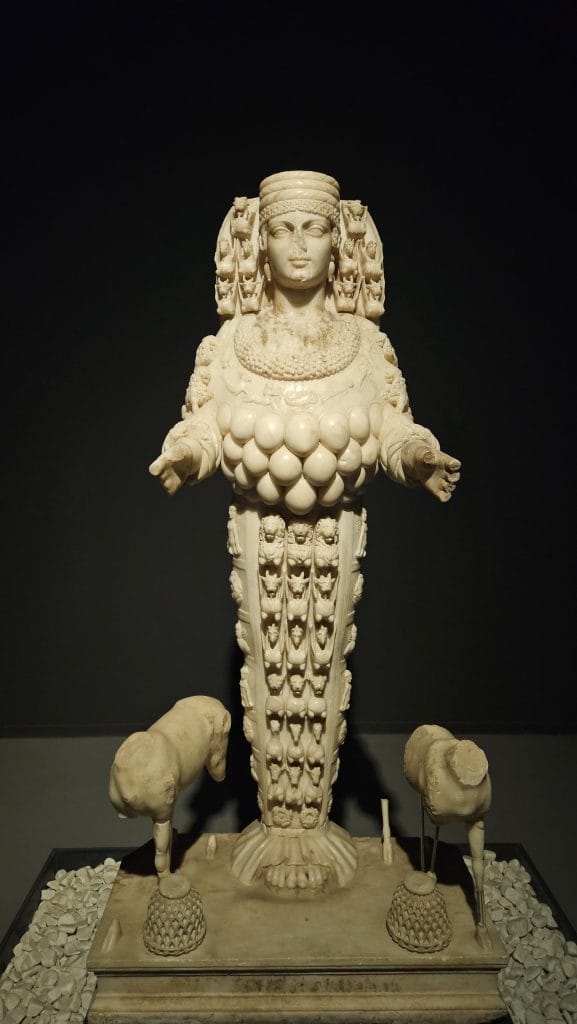
Journey
A large, sturdy boat, a reliable captainand crew were prepared. Plenty of food, drink, servants, and slaves were placed on the boat. They were also given a large amount of money, gold, and silver. The next day, almost all the citizens of Ephesus and their families came to see these beautiful and married young men off. Everyone tearfully saw these two beautiful and married young men off and prayed to all the gods and goddesses to send them back to their homeland, the ancient city of Ephesus, safe and sound. At that moment, the boat carrying the married couple slowly disappeared.
The newlyweds on the boat spoke sweet words to each other until they passed Samos, the sacred island of Goddess Hera, and promised that they would never be separated, no matter what.
At first, the journey was smooth and safe. They passed through the island of Kos and the ancient city of Knidos and arrived at the island of Rhodes smoothly and beautifully, and stopped at the island of Rhodes to resupply the boat and buy provisions.
Here, water, bread, and other food needed for their ships would be purchased. The Rhodians thought that these two beautiful Ephesian girls and men who came ashore were gods and goddesses, and held a great feast in their honor. Before leaving Rhodes, these newlywed Ephesians went to the temple of Helios and presented a golden vase to the sun god. On the vase was the inscription, “Oh sun god, this gift was presented to you by two young men named Antheia and Habrokomes from the beautiful city of Ephesus.”
When the preparations were completed, the journey started again, but after a short while, the wind stopped, and the boat could not move and remained in the middle of the sea. The worst part was that a Phoenician pirate ship had this ship under surveillance. The pirate Korimbos was aware of the value of the Ephesian boat. He had smelled it like a shark and was waiting for the right moment.
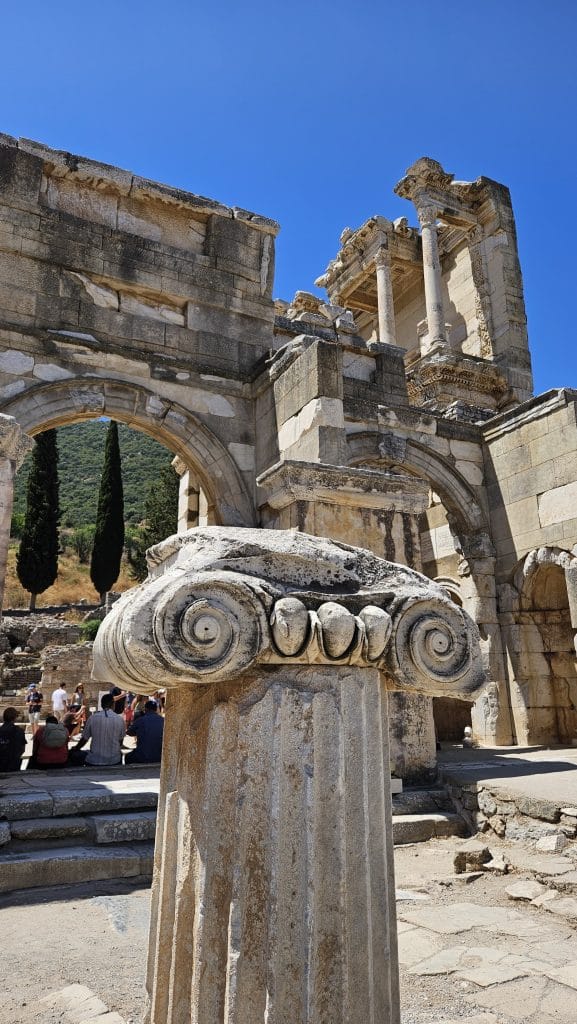
Slavery
When the pirates found the opportunity, they attacked the boat, plundered it, and captured everyone on board. Then they set the boat on fire and sank it. He was planning to take them to the city of Tyre (a port city of the Phoenician State) and sell them. But events changed very quickly. The captain of the pirates, Korimbos, had fallen in love with Habrokomes, and his assistant, Evskinos, had fallen in love with Antheia.
Both men made separate suggestions to the young men and said,
– It is in your hands to be a master instead of a prisoner, and a wealthy person instead of a poor person.
The young married Ephesians asked for permission to think and met secretly to tell each other what had happened. Then they swore allegiance to each other again.
When they landed, the owner of the ship, the pirate Aspirtos, was waiting on the shore with his ship, his men, the captives, and the loot. When he saw the two young men among the captives, he was very impressed and thought that these beautiful Ephesians would be worth a lot of money. Everyone who saw these beautiful Ephesians was amazed by their beauty. The pirate Aspirtos took his new slaves and left them at home, and went to Syria for a job.
Manto, the only daughter of the pirate Aspirtos, fell in love at first sight when she saw Habrokomes coming home. A few days later, she poured her heart out to Rhode, a slave girl who was watching over Antheia and was captured with Antheia. When she told Levkon, who was captured with them, and Habrakomes, who was also a friend of Levkon, the young and beautiful Anthia was very angry, but unfortunately,y there was nothing she could do. After all, Antheia was a slave too.
Unable to achieve results in this way, Manto, the daughter of Pirate Aspirtos, wrote a letter expressing her love for Habrokomes. Receiving the letter, Habrokomes replied to Manto, “You can possess my body, but not my soul, because your soul belongs to my wife,” and rejected the girl’s request to be together. In the meantime, Manto’s father, Pirate Aspirtos, had returned from Syria with a candidate named Moeris for his daughter.
Thereupon, Manto became angry, tore her clothes and disheveled her hair, and told her father that her slave Habrokomes of Ephesus had attacked her and was trying to possess her. Upon hearing this, her father, the Pirate Aspirtos, became very angry and had his handsome slave Habrokomes of Ephesus shackled and thrown into prison, and subjected the young Ephesus man to unbearable torture.

Lovers’ Separation
When Manto arrived in Syria, the Pirate father Aspirtos sent his slave, Levkon, and de Rho, de to be sold in the slave market. A kind-hearted man who bought these two slaves adopted both sl, Levkon and de Rhode.
The pirate Aspirtos gave the beautiful Ephesian girl Antheia, who was a slave, to a shepherd named Lampo, who lived in the village, as his wife because of his jealousy. The beautiful Ephesian slave Antheia told the shepherd Lampo everything that had happened to her. The rough-looking shepherd Lampo was a very good person. He felt very sorry for Antheia and promised with his tearful eyes that he would never touch this beautiful girl.
Meanwhile, Pirate Aspirtos finds the letter his daughter Manto wrote to the handsome Ephesian slave Habrokomes and, seeing the injustice he has done, releases the handsome Ephesian slave and apologizes to Habrokomes. Pirate Aspirtos asks Habrokomes to help him, but Habrokomes does not accept this offer.
While these were happening, Moeris, the husband of Manto, the daughter of the Pirate Aspirtos, set his eyes on the beautiful and young slave girl from Ephesus, Antheia. He told his troubles to the shepherd Lampo and asked for this young and beautiful slave girl from Ephesus to be his wife.
Bad Fortune
Shepherd Lampo tells these events to Manto, the daughter of Pirate Aspirtos. Manto tells him to kill the beautiful slave girl from Ephesus, Antheia. Shepherd Lampo, who could not bear the beautiful slave girl from Ephesus, takes her to the port and sells her to bandits coming from Cilicia, the leader of which is Hippothoos. Because otherwise Antheia would be killed. Afterwards, shepherd Lampo lies to Manto, the daughter of Pirate Aspirtos, that he killed Antheia, the beautiful slave girl from Ephesus, and her husband, and threw her into the sea.
Hearing from a letter written by Manto to his father Asprytos about what happened to his precious wife Antheia, Habrokomes finds the shepherd Lampo, who was sold by the Pirate Asprytos, after a long and tiring journey. Meanwhile, the Cilician bandits who bought the beautiful slave girl Antheia from Ephesus and their leader Hippothoos, go ashore and take shelter in a village due to the wind changing direction near Tarsos.
The Cilician Pirates, whose business was going badly, found the reason for this in Antheia, a young and beautiful slave girl from Ephesus. Forr their business to improve, they decided to sacrifice Antheia to the god Ares. Just as they were about to sacrifice Antheia to the god Ares, Perialos, the ruler of the city of Tarsos, and his men passed by and saved Antheia.
Perialos, the ruler of the city of Tarsos, brings Antheia to his palace. Ruler Perialos fell in love with Antheia from Ephesus the moment he saw her. Ruler Perialos’ wife had also recently died. Therefore, Ruler Perialos thought that the beautiful Antheia from Ephesus would be a good wife for him and shared this idea with Antheia from Ephesus, but to gain time, Antheia accepted the marriage proposal of the ruler from Tarsos in return for not touching him for 30 days.
Meanwhile, the handsome Habrokomes of Ephesus began to travel throughout Anatolia to find his beautiful wife Antheia of Ephesus. He eventually reached Cilicia and encountered the Cilician bandit Hippothoos. Habrokomes of Ephesus and Hippothoos of Cilicia became good friends. One day, Habrokomes of Ephesus told Hippothoos of Cilicia why he had come to Cilicia and how he had lost his beloved wife.
The Cilician Hippothoos, who was very surprised by this, said that he had met the beautiful Antheia of Ephesus and that Perialos, the ruler of Tarsus, had taken Antheia from them just as they were about to sacrifice her to Ares. He also said that he would help his friend Habrokomes to find the beautiful girl Antheia of Ephesus.
Gods’ help
At that time, an Ephesian doctor had come to Tarsos. Perialos of Tarsos thought that it would be good for his soon-to-be wife, Antheia of Ephesus, to talk to this physician from his land, so he left them alone. The beautiful Ephesian girl Antheia told the physician what she had experienced. She said that she wanted to kill herself, so she could not give him poison because she had promised her husband Habrokomes that if she was going to be with someone else, she had to die.
The Ephesian doctor says that he knows them and that the love of this beautiful Ephesian couple is talked about in Ephesus, and that he will give Antheia some medicine and that she should take it on the wedding day.

On the wedding day, Antheia of Ephesus, who did as the doctor said, collapsed. A grand funeral was held for Antheia, who was thought to be dead, and then the beautiful girl of Ephesus came to in the tomb after a certain amount of time.
The Ephesian doctor gave Antheia drugs that would make her appear lifeless for a certain period. At this very moment, grave robbers entered Antheia’s tomb chamber, looted her belongings, and took Antheia by ship to Alexandria. They sold the beautiful Ephesian girl to an Indian prince named Psamis in Alexandria.
After these events, Habrokomes came to Tarsus and learned what had happened to his beautiful wife Antheia of Ephesus, and set off on the road again. At that time, the Indian Prince who sold Antheia wanted to marry the beautiful girl from Ephesus. Antheia told the Indian Prince that she could not marry for a year because she was devoted to the Goddess Isis. The Indian Prince promised to wait for the beautiful Antheia of Ephesus because of his fear of the gods and goddesses.
Meanwhile, Antheia, who finds a way to escape, escapes from the Indian Prince and, on the way, stops by the island of Rhodes and goes to the temple of Helios. She cuts a lock of her hair and makes an offering with the inscription “Antheia offered her hair to the god on behalf of her beloved husband Habrokomes.”
Happy Ending
At this very moment, Habrokomes, who has become desperate in his search for Antheia, decides to return to Ephesus. While Habrokomes is on his way to Ephesus, he goes to the temple of Helios in Rhodes and looks at the golden vase they had previously offered to the sun god, and sees Antheia’s lock of hair and offering. When he takes Antheia’s writing in his hand and reads it, his eyes fill with tears, a nd he remains motionless for a long time.
Afterwards, Habrokomes, who had recovered himself, went to the priest of Helios and told him what had happened. The priest said, “That woman was here a moment ago, run and find her immediately, I will pray to the gods for you.” Habrokomes flew out of the temple like an arrow and started running through the streets of Rhodes in tears, shouting, “Antheia, Antheia!” and started looking for his wife.
Not long after, Habrokomes found his wife Antheia in one of the streets of the city and hugged her tightly, never to be separated again. The people of Rhodes who witnessed this watched with tears in their eyes. The people of Rhodes organized a magnificent feast for this young couple who had the beauty of a god and a goddess, and the next day, they bid them farewell with a great ceremony.
A few days later, two beautiful, married young men arrived in Ephesus. Every Ephesian who heard of their arrival left everything behind and ran to the Ephesian port. The mothers and fathers of this beautiful Ephesian couple had already gone to Hades, but their siblings and relatives were also in the Ephesian port. Overcoming the difficulties and willing to die for their love, Ephesian Antheia and Habrokomes went directly to the temple of Artemis, the symbol and patron goddess of Ephesus, and made an offering there, immortalizing their experiences in an inscription. They spent the rest of their lives in Ephesus happily and healthily.
